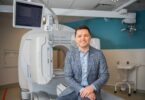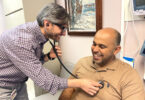The human eye is a small but mighty organ that lets us interpret shapes, colours and light in the world around us. Like all the organs in our body, it’s important to take care of our eyes to maintain our vision and overall health.
There are many urban legends surrounding eye health, but are any of them actually true?
As we mark Vision Month this May, we asked Dr. Kenneth Eng, chief of the Department of Ophthalmology and Vision Sciences at Sunnybrook, to answer some “old wives’ tales” and common questions about eye health.
“Eating carrots will improve my eyesight”
While carrots contain beta-carotene, a substance closely related to vitamin A which is essential to the metabolic function of the retina, there is nothing magical in consuming carrots that would result in improved eyesight or a reduced need for glasses.
It’s important for people to try to maintain a healthy diet rich in many nutrients. This can be protective in terms of reducing the risk of certain conditions, like age-related macular degeneration, but it is unlikely that mega-doses are beneficial for otherwise healthy individuals.
“Don’t sit too close to screens”
There is no evidence that sitting very close to screens causes any permanent injury to your eyes. However, prolonged screen time can result in eye strain or discomfort and can result in more dry eye symptoms. In children, there is some evidence that increased screen time may lead to greater myopia, or nearsightedness, and that increasing outdoor activities may be protective.
It is good to keep in mind the 20-20-20 rule: take a 20 second break every 20 minutes to look at something at least 20 feet away.
“Reading in poor lighting will hurt my eyes”
Much like sitting close to a screen, reading in poor light will not result in harm to eyesight but can be a cause for symptoms of eye strain and can exacerbate dry eye symptoms. Especially in older adults needing reading glasses or bifocals, reading in dim light will makes it significantly more difficult to read efficiently given the reduced contrast of print. It’s always sensible to read in well-lit areas and/or adjust the brightness on a screen to optimize reading comfort.
“Wearing glasses make your eyes weaker”
It is important that, if you need corrective prescription glasses, that you wear them regularly. Eyes do not become more dependent when wearing glasses or contact lenses. On the contrary, there is evidence that for children with myopia, maintaining a clear image on the retina with their full prescription reduces the likelihood of as much progression of their nearsightedness. People with hyperopia, or farsightedness, can develop eye strain and headaches without their glasses.
You should always avoid wearing someone else’s glasses as an incorrect prescription can lead to eye strain and discomfort. If you are not comfortable with your glasses (old or new), you should see your eye care professional to ensure that they have the correct prescription.
“Eye exams can only tell me about my vision”
There are many ocular conditions like cataracts, glaucoma, and macular degeneration that are screened and diagnosed by regular eye exams, but many systemic conditions may appear during these exams too!
Even in patients without visual symptoms, common conditions such as diabetes, hypertension, and high cholesterol can be detected. Much more rare conditions such as metabolic and inflammatory diseases and even cancers can occasionally be detected and diagnosed in the course of a routine eye exam.
Eyes are a window not only to the soul but an important way for doctors to screen for other systemic conditions!








